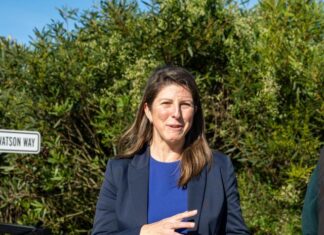Andrew Mathieson
WHEN Julie Cameron is asked to say cheese, she can’t wipe the smile off her face.
Julie turned the Meredith Dairy name from a little display on the town’s general store into a staple on the menus of international restaurants.
But when thinking deeply about the secrets to cheesemaking, Julie scratches her head in puzzlement.
“They can put a man on the moon but, you know, they still don’t know why cheese tastes the way it does,” she contemplates.
“It’s such a complex thing, cheese. There are too many different variants and not every cheese is the same.
“There is a scientist in France who took cheese from a laboratory, looked at it in a controlled environment and found many more micro-organisms than were (initially) added to the cheese.”
Julie’s wonderment at the science behind cheese belies a strong biochemistry background that led her into specialising in intensive care units in her former career as a nurse.
Sick of driving long distances to the hospital every day, she swapped the nasty-looking bacterias of hospital for the flavour-enhancing ones of the dairy.
Now she utilises the bugs to produce a range of several chevre cheeses, fettas, ashed pyramids of goat cheese, woodbourne, blue-milk cheese and especially a widely acclaimed marinated goat cheese in extra virgin olive oil.
Cheesemaking is a delicate balance between artisan and scientist, Julie explains. The number of gumboots at the front door of the office homestead suggests farmer is somewhere in between both.
“You can creatively make a cheese and not know that much about science but when you have to be make it consistently you need to have a fair bit of science behind you,” she notes.
The Cameron family had been farming its 1200-hectare Meredith property on a well-worn gravel road bearing the same name since 1924.
After three generations made their livings on the land, Julie and husband Sandy decided living off commodity prices was not longer sustainable – value-adding to dairy products was the way of the future.
The Camerons and a Gippsland farmer were first to change the industry’s antiquated ways in which milk could take up to a week to reach a cheese factory.
“Goat’s cheeses 20 years ago were incredibly, well, terrible and a lot of people wouldn’t eat goat’s cheese because it tasted and smelt like billy goat,” Julie says.
“Basically, that was because there was a small number of farmers milking just a handful of goats.”
Goat’s cheese is now so popular that Meredith Dairy milks five times more goats than sheep.
The company’s growing brand only came about so Julie and Sandy could have a day off.
They had to hire an extra milker, so to justify the extra pay the farm had to milk more goats and then build a bigger on-site factory.
Benchmarking against the best French cheeses, Meredith Dairy now exports to 14 countries including targeted markets New Zealand, USA, Japan and United Arab Emirates’ largest city, Dubai.
“It’s all a bit exciting,” Julie admits.
“It’s a bit of a head-swelling exercise to do that because there is enormous potential.”
As what Bega cheese did for the small New South Wales town of the same name, Meredith is doing the same for the halfway stop on the Midland Highway.
So much so that, the town’s reputation is growing so fast that Julie tells how a Ballarat restaurateur is promoting a food and wine festival at Meredith when it is actually a lot closer to Lethbridge.
“Initially Meredith was known as Henry Bolte country but because everyone who knew him is dying and he’s died, now it’s known for the Meredith Music Festival and Meredith’s cheese,” she says.
Meredith’s big cheese
Digital Edition
Subscribe
Get an all ACCESS PASS to the News and your Digital Edition with an online subscription
Crossing safety for Barwon Heads
Two raised pedestrian crossings will be installed at a busy Barwon Heads intersection the state government announced.
The crossings will be at the Barwon Heads...








